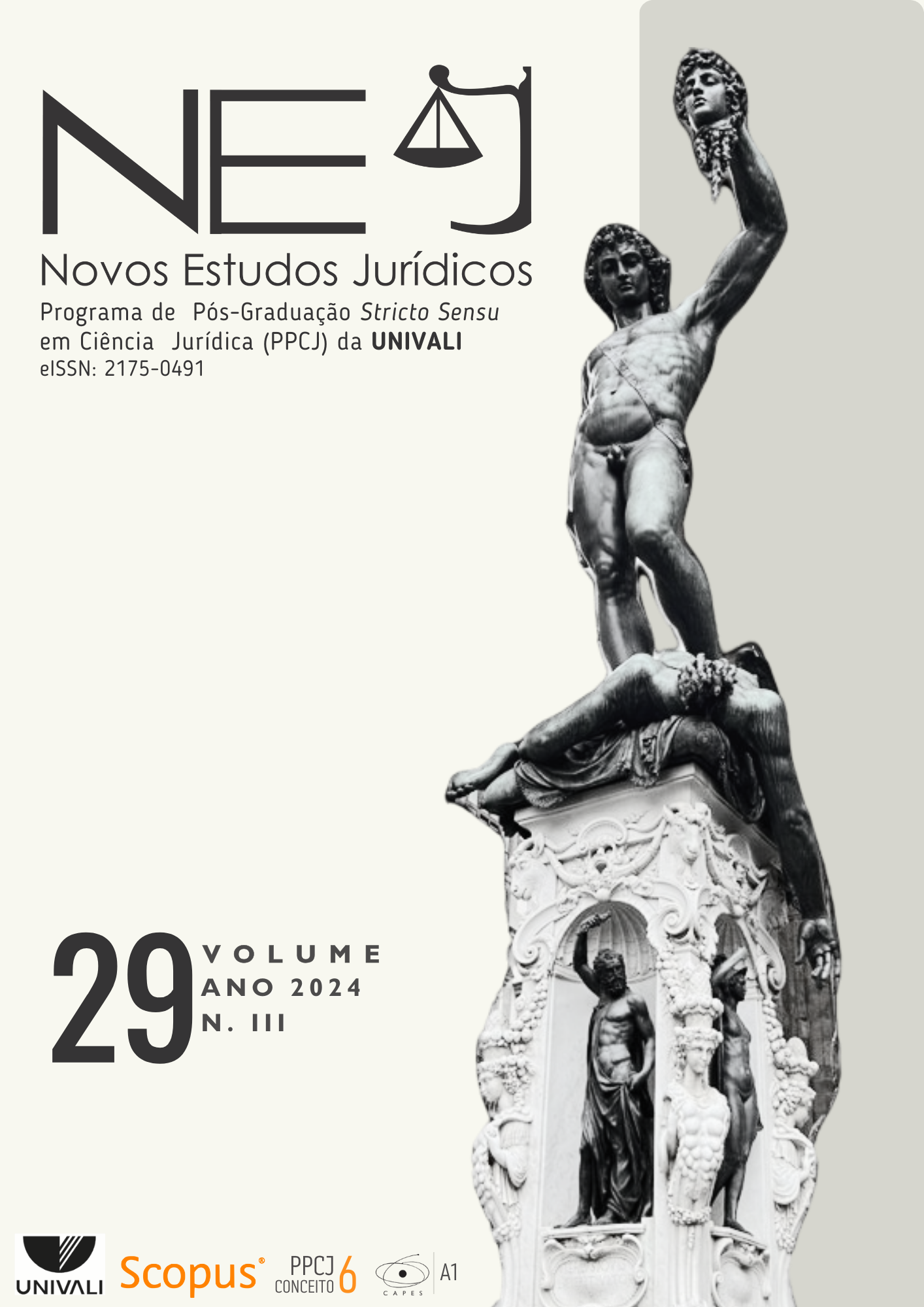POLITICAL CONTENTS MODERATION: HIGH-PROFILE FREEDOM OF EXPRESSION
DOI:
https://doi.org/10.14210/nej.v29n3.p540-560Keywords:
Content Moderation, Elections, Meta, Cross-check Program, Freedom of ExpressionAbstract
Contextualization: If the issue of content moderation on platforms already raises stormy discussions, the problem is even greater when it comes to political issues. The topic is especially sensitive in election years, but it has a social impact at any time, especially regarding its possible repercussions on the democratic game. Between mistakes and successes, companies involved in this challenge have created specific strategies to deal with the matter, as is the case with Meta, by creating the cross-check program for the called high-profiles. Considering this scenario, the question arises: What criteria or criteria does Meta apply to the review of political content?
Objective: The objective of this study is to demonstrate how the normative arrangement of the Meta for moderation of content published by politicians has been constructed, especially following the Trump case, which gave rise to the most complex of the recommendations made by the Supervisory Committee created by the company.
Method: Methodologically, it adopts the socio-legal line, analyzing content moderation from a broader perspective of an external observer. Predominantly using inductive reasoning, the technique consisted of surveying and studying documents and bibliography, with a special focus on those coming from the Meta’s Oversight Board.
Results: Ultimately, it was possible to clearly verify the divergences and convergences in the criteria adopted by the Meta and in the Committee's own decisions, highlighting possible risks of an ad hoc application of the right to freedom of expression, substantiating what could be called “high-profile freedom of expression”.
Downloads
References
ANÁLISE precisa de conteúdo de alto impacto pelo nosso sistema de verificação cruzada. Meta Transparency Center. 2023, s.p. Disponível em: https://transparency.fb.com/pt-pt/enforcement/detecting-violations/reviewing-high-visibility-content-accurately/ Acesso em 13 maio 2023.
BRAZILIAN General Speech (2023-001-FB-UA). Oversight Board. 22 jun. 2023. Disponível em: https://www.oversightboard.com/news/6509720125757695-oversight-board-overturns-meta-s-original-decision-in-brazilian-general-s-speech-case/ Acesso em 03 mar. 2023.
DOUEK, Evelyn. Content Moderation as Systems Thinking. Harvard Law Review. v. 136 n. 2 p. 528-607, dez. 2022.
FORMER President Trump’s Suspension. Oversight Board, 2021. Disponível em: https://www.oversightboard.com/decision/FB-691QAMHJ. Acesso em 29 maio 2023.
HORWITZ, Jeff. Facebook Says Its Rules Apply to All. Company Documents Reveal a Secret Elite That’s Exempt. The Wall Street Journal. New York City. 13 set. 2021. Disponível em: https://www.wsj.com/articles/facebook-files-xcheck-zuckerberg-elite-rules-11631541353 Acesso em 29 maio 2023
KADRI, Thomas E.; KLONIK, Kate. Facebook v. Sullivan: Public Figures and Newsworthiness in Online Speech. Southern California Law Review. v. 93, n. 19-20, p. 37-99, 2019.
MAJÓ-VÁZQUEZ, Silvia; CONGOSTO, Mariluz; NICHOLLS, Tom; NIELSEN, Rasmus Kleis. The Role of Suspended Account in Political Discussion on Social Media: Analysis of the 2017 French, UK and German Elections. Social Media + Society. p. 1-20, jul./set. 2021. DOI: https://doi.org/10.1177/20563051211027202
META’S cross-check program. Oversight Board. Disponível em: https://www.oversightboard.com/decision/PAO-NR730OFI/ Acesso em 29 maio 2023.
POLICY advisory opinion on Meta’s cross-check program. Oversight Board. 2021. Disponível em: https://transparency.meta.com/pt-br/pao-cross-check-policy/ Acesso em 29 maio 2023.
YOUNG, Greyson K. How much is too much: the difficulties of social media content moderation. 30 jan. 2021. Disponível em: https://papers.ssrn.com/sol3/papers.cfm?abstract_id=3792647 Acesso em 13 maio 2023. DOI: https://doi.org/10.2139/ssrn.3792647
UNITED NATIONS. Annual report of the United Nations High Commissioner for Human Rights. 2012. Disponível em: https://www.ohchr.org/sites/default/files/Rabat_draft_outcome.pdf. Acesso em: 08/07/2023.
UNITED NATIONS. International Covenant on Civil and Political Rights. Disponível em: https://www.ohchr.org/en/instruments-mechanisms/instruments/international-covenant-civil-and-political-rights. Acesso em: 08/07/2023.
VUKČEVIĆ. Ivana. Facebook Oversight Board’s Decision on the Indefinite Suspension of Donald Trump’s Acoount. PravniZapisi. v. 12, n. 1, p. 295-311, 2021. DOI: https://doi.org/10.5937/pravzap0-32521
Downloads
Published
How to Cite
Issue
Section
License
Na qualidade de autor(es) da colaboração, original e inédita, sobre o qual me(nos) responsabilizo(amos) civil e penalmente pelo seu conteúdo, após ter lido as diretrizes para autores, concordado(amos) plenamente com as Políticas Editorias da Revista Novos Estudos Jurídicos - NEJ e autorizo(amos) a publicação na rede mundial de computadores (Internet), permitindo, também, que sua linguagem possa ser reformulada, caso seja necessário, sem que me(nos) seja devido qualquer pagamento a título de direitos autorais, podendo qualquer interessado acessá-lo e/ou reproduzi-lo mediante download, desde que a reprodução e/ou publicação obedeçam as normas da ABNT e tenham a finalidade exclusiva de uso por quem a consulta a título de divulgação da produção acadêmico científico.





























